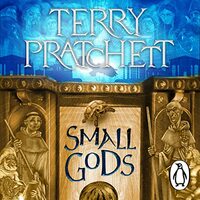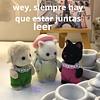Take a photo of a barcode or cover
funny
inspiring
reflective
tense
fast-paced
Plot or Character Driven:
A mix
Strong character development:
Yes
Loveable characters:
Yes
Diverse cast of characters:
Yes
Flaws of characters a main focus:
Yes
Hilarious
(Nigel Planer's audiobook version)
After falling down the rabbit hole of which Discworld book to start with (an oddly spiritual journey in itself), I finally landed on Small Gods. Trust me when I say this, I couldn’t have asked for a better introduction.
The book didn’t just meet my expectations, but it completely exceeded them. I did expect some humor and satire going in thanks to all the various influences of Discworld as a series and literally anybody who talks about it. But what I DID NOT expect is how Sir Terry Pratchett takes on organized religion with a level of wit, depth, and such compassion.
He explores belief, power, tradition, and the quiet courage of thinking for yourself, all while making you laugh at the absurdity of it all. Somehow, he makes big ideas feel personal and funny without ever losing their weight.
Some of the lines in this book genuinely changed how I think about writing. You read (or in this case listen) to a line or two and then it just CLICKS. This is how it's supposed to be, you'd feel. Sir Pratchett has a way of delivering wisdom with humor and clarity that hits you when you least expect it. There were moments that made me stop and just appreciate how a single sentence could carry so much.
The last hour of the book was one of the most satisfying and powerful endings I’ve experienced in fiction (so far). It was clever, emotional, and full of tension, all while staying true to the book’s tone. I honestly don’t know how Pratchett could top this. Small Gods didn’t just become my favorite Discworld novel, it made me rethink what a fantasy book can be.
Insightful, hilarious, moving, and unexpectedly profound.
I couldn’t have asked for a better place to start.
After falling down the rabbit hole of which Discworld book to start with (an oddly spiritual journey in itself), I finally landed on Small Gods. Trust me when I say this, I couldn’t have asked for a better introduction.
The book didn’t just meet my expectations, but it completely exceeded them. I did expect some humor and satire going in thanks to all the various influences of Discworld as a series and literally anybody who talks about it. But what I DID NOT expect is how Sir Terry Pratchett takes on organized religion with a level of wit, depth, and such compassion.
He explores belief, power, tradition, and the quiet courage of thinking for yourself, all while making you laugh at the absurdity of it all. Somehow, he makes big ideas feel personal and funny without ever losing their weight.
Some of the lines in this book genuinely changed how I think about writing. You read (or in this case listen) to a line or two and then it just CLICKS. This is how it's supposed to be, you'd feel. Sir Pratchett has a way of delivering wisdom with humor and clarity that hits you when you least expect it. There were moments that made me stop and just appreciate how a single sentence could carry so much.
The last hour of the book was one of the most satisfying and powerful endings I’ve experienced in fiction (so far). It was clever, emotional, and full of tension, all while staying true to the book’s tone. I honestly don’t know how Pratchett could top this. Small Gods didn’t just become my favorite Discworld novel, it made me rethink what a fantasy book can be.
Insightful, hilarious, moving, and unexpectedly profound.
I couldn’t have asked for a better place to start.
adventurous
funny
lighthearted
fast-paced
Plot or Character Driven:
A mix
Strong character development:
Yes
Loveable characters:
Yes
Diverse cast of characters:
No
Flaws of characters a main focus:
No
adventurous
funny
lighthearted
medium-paced
Plot or Character Driven:
Plot
Strong character development:
Complicated
Loveable characters:
Yes
Diverse cast of characters:
No
Flaws of characters a main focus:
Yes
Another fun entry in Discworld.
adventurous
emotional
funny
hopeful
inspiring
lighthearted
fast-paced
Plot or Character Driven:
A mix
Strong character development:
Yes
Loveable characters:
Yes
Diverse cast of characters:
Yes
Flaws of characters a main focus:
Yes
adventurous
dark
funny
hopeful
tense
medium-paced
Plot or Character Driven:
Plot
Strong character development:
Yes
Loveable characters:
Yes
Diverse cast of characters:
No
Flaws of characters a main focus:
Yes
Slow start but then it gets crazy and Brutha starts making me leap out of my seat like I’m watching football.
Strong character development:
Yes
Since before I began reading Gaiman this year, I knew that one of the things I wanted to do in my life was to tackle Terry Pratchett's Discworld. Of course, I wasn't going to go head first into a challenge like that withou knowing anything about Pratchett's writing style, so that was my primary motivation for having read Good Omens.
Fast forward a couple (or more than a couple) months later, I have begun with Discworld. Small Gods is not really linked to a big story arc, or so I have read. Because of it, it's a nice read, that doesn't require any knowledge of the Disc to be understood perfectly.
Small Gods is about religion, as the title might hint. In Omnia, they believe in the Great God Om, a big theocracy is built around their religion, and they are a mighty and thriving empire. Among the very devuout Omnians, there is a novice, Brutha, who is a bit... let's just say, he isn't the brightest out of all the other novices. In the beginning of the book, his superiors even comment that he is not going to be ordered as a priest. Brutha is a very good person, with good morals and all that jazz. He also possesses an excellent photographic memory, being even able to remember the moment of his birth. To add to this, he also really /believes/.
As big as his faith is, he can't help but be suspicious when a talking turtle approaches him, and tells Brutha that it (the turtle) is his Great God Om. Because, as the Omnian folclore says, when incarnated, Om takes the form of an Ox or a Swan. Nothing as petty as a turtle.
Soon it is revealed to the readers that Om is in that poor shape because he has lost his powers. A god, you must know, gains power by having believers. But if Om, the god of all Omnia is powerless, then, what do the people believe in?
The answer to that question is the first of many jabs that the book has to real world religions, that might hit sore spots in some people. Nevertheless, they have truth to them.
Although the book itself is really humorous (Pratchett's footnotes are pure comedy), because of its main theme it can get quite dark and philosophical at times. Other than criticizing the state of Church and their believers, the book also has a debate that might remember people of Galilei vs Religion, with "De Chelonian Mobile" being similar to "Eppur si muove".
In the end, this book is resolved pretty nicely and happily, with Om regaining his powers, among other nice things.
I don't think I would have cared so much for this one if the characters had been blander. It's a good story, an enthralling plot, alright, but what it really sold the story to me were both Brutha and Om, and their hilarious interactions, and their character development. I think I'm a sucker for good characters with good character development, and this book certainly satiated me of my craving.
A highly recommendable read, all in all.
Fast forward a couple (or more than a couple) months later, I have begun with Discworld. Small Gods is not really linked to a big story arc, or so I have read. Because of it, it's a nice read, that doesn't require any knowledge of the Disc to be understood perfectly.
Small Gods is about religion, as the title might hint. In Omnia, they believe in the Great God Om, a big theocracy is built around their religion, and they are a mighty and thriving empire. Among the very devuout Omnians, there is a novice, Brutha, who is a bit... let's just say, he isn't the brightest out of all the other novices. In the beginning of the book, his superiors even comment that he is not going to be ordered as a priest. Brutha is a very good person, with good morals and all that jazz. He also possesses an excellent photographic memory, being even able to remember the moment of his birth. To add to this, he also really /believes/.
As big as his faith is, he can't help but be suspicious when a talking turtle approaches him, and tells Brutha that it (the turtle) is his Great God Om. Because, as the Omnian folclore says, when incarnated, Om takes the form of an Ox or a Swan. Nothing as petty as a turtle.
Soon it is revealed to the readers that Om is in that poor shape because he has lost his powers. A god, you must know, gains power by having believers. But if Om, the god of all Omnia is powerless, then, what do the people believe in?
The answer to that question is the first of many jabs that the book has to real world religions, that might hit sore spots in some people. Nevertheless, they have truth to them.
Although the book itself is really humorous (Pratchett's footnotes are pure comedy), because of its main theme it can get quite dark and philosophical at times. Other than criticizing the state of Church and their believers, the book also has a debate that might remember people of Galilei vs Religion, with "De Chelonian Mobile" being similar to "Eppur si muove".
In the end, this book is resolved pretty nicely and happily, with Om regaining his powers, among other nice things.
I don't think I would have cared so much for this one if the characters had been blander. It's a good story, an enthralling plot, alright, but what it really sold the story to me were both Brutha and Om, and their hilarious interactions, and their character development. I think I'm a sucker for good characters with good character development, and this book certainly satiated me of my craving.
A highly recommendable read, all in all.
funny
reflective
medium-paced
Plot or Character Driven:
Character
Strong character development:
Yes
Loveable characters:
Yes
Diverse cast of characters:
Complicated
Flaws of characters a main focus:
Yes





